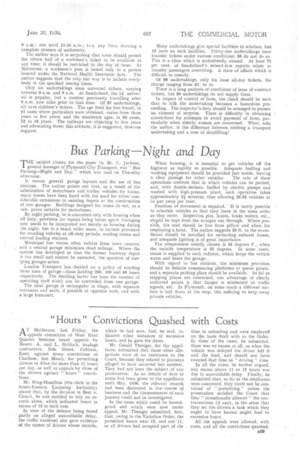" Hours " Convictions Quashed with Costs
Page 101

If you've noticed an error in this article please click here to report it so we can fix it.
AT Maidstone, last Friday, the appeals committee of West Kent Quarter Sessions heard appeals by Messrs. A. and L. Baldock, haulage contractors, Sole Street, Cobham, Kent, against seven convictions at Chatham, last March, for permitting drivers to drive for more than 11 hours per day, as well as appeals by three of the drivers against " hours " convictions.
Mr. Ring-Hamilton (the clerk to the South-Eastern Licensing Authority) stated that, by the decision in Beer v. Clench, he was entitled to rely on records alone, which indicated hours in excess of 13 in each case.
In view of the defence being based partly on alleged unavoidable delay. the traffic examiner also gave evidence of the names of drivers whose records,
which he had seen, had, he said, indicated other instances of excessive hours, and he gave the dates.
Mr. Gerald Thesiger, for the appellants, submitted that those other allegations were of no assistance to the Court, because they related to journeys alleged to have occurred last summer. They had not been the subject of any prosecution. As no details of date or name had been given to the appellants until May, 1936, the relevant records had been destroyed in the course of business and the circumstances of each journey could not be investigated.
In the cases which could be investigated and which were now under appeal, Mr. Thesiger submitted, first, that, owing to the Variation Order, the permitted hours were 12, and not 11, as all drivers had occupied part of the
time in unloading and were employed on the basis dealt with in the Order. In three of the cases, he submitted, there was no excess at all, as when the vehicle was delayed the driver left it and the load, and should not have counted that time as " driving " time.
• In all the cases, he further argued, any excess above 11 or 12 hours was doe to unavoidable delay. Finally, he submitted that, so far as the employers were concerned, they could not be convicted of " permitting " unless the prosecution satisfied the Court that they " intentionally allowed " the contraventions (if any), in the sense that they set the drivers a task which they ought to have known might lead to excessive hours.
All the appeals were allowed, with costs, and all the corivictions'quashed. B59












































































































































